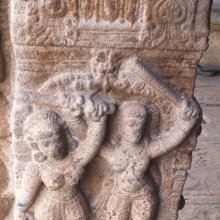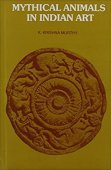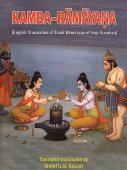Matsya, Mātsya: 46 definitions
Introduction:
Matsya means something in Buddhism, Pali, Hinduism, Sanskrit, Jainism, Prakrit, the history of ancient India, Marathi, Hindi. If you want to know the exact meaning, history, etymology or English translation of this term then check out the descriptions on this page. Add your comment or reference to a book if you want to contribute to this summary article.
Matsya has 45 English definitions available.
Alternative spellings of this word include Matsy.
Images (photo gallery)
Languages of India and abroad
Sanskrit dictionary
[Deutsch Wörterbuch]
Source: Cologne Digital Sanskrit Dictionaries: Böhtlingk and Roth Grosses Petersburger WörterbuchMatsya (मत्स्य):—
--- OR ---
Mātsya (मात्स्य):—(von matsya)
1) adj. vom Fisch herrührend, ihm eigen, ihn betreffend [Śāṅkhāyana’s Gṛhyasūtrāṇi 1, 27.] māṃsa [Yājñavalkya’s Gesetzbuch 1, 257.] rūpa Fischgestalt [Bhāgavatapurāṇa 1, 3, 15. 5, 18, 24. 8, 24, 2.] āsana [Oxforder Handschriften 11,a, Nalopākhyāna 1.] nyāya [Spr. 1707.] purāṇa [Mārkāṇḍeyapurāṇa S. 659, Śloka 4.] [Madhusūdanasarasvatī’s Prasthānabheda] in [Weber’s Indische Studien.1,18,10.] [Oxforder Handschriften.8,a,3. 59,a,40. 65,b,2. 79,b,31.] kalpa [65,b,29.] —
2) m. a) ein Fürst der Matsya [The Śatapathabrāhmaṇa 13, 5, 4, 9.] [Mahābhārata 5, 1846.] [Harivaṃśa 9146.] — b) Nomen proprium eines opferkundigen Ṛṣi [Taittirīyabrāhmaṇa 1, 5, 2, 1.] [Mahābhārata 12, 10875.] [Vāyupurāṇa] in [Viṣṇupurāṇa 277, Nalopākhyāna 8] (matsya v. l., vātsya [Viṣṇupurāṇa][?). SAṂSK. K. 184,a,10]; vgl. auch [Atharvavedasaṃhitā 19, 39, 9.]
Source: Cologne Digital Sanskrit Dictionaries: Sanskrit-Wörterbuch in kürzerer FassungMatsya (मत्स्य):—( matsyā [Kāśikā]). yodhin , rohin und vañcin Adj. gaṇa yuktārohyādi.
--- OR ---
Matsya (मत्स्य):——
1) m. — a) Fisch. Personificirt als Fürst mit dem Patron. sāṃmada. Am Ende eines adj. Comp. *f. ā — b) *ein best. Fisch. — c) Du. die Fische im Thierkreise. — d) eine best. Figur [Hemādri’s Caturvargacintāmaṇi 1,126,8.] = svastikamadhyākṛtiḥ [12,13.] — e) eine best. Lichterscheinung. — f) Pl. Nomen proprium eines Volkes. — g) ein Fürst der Matsya. — h) Nomen proprium — α) eines Sohnes des Vasu Uparicara und Fürsten der Matsya. — β) eines Lehrers. —
2) f. matsya — a) Fischweibchen. — b) Nomen proprium einer Tochter des Vasu Uparicara.
--- OR ---
Mātsya (मात्स्य):——
1) Adj. von Fisch herrührend , ihm eigen , ihn betreffend. —
2) m. Nomen proprium eines opferkundigen Ṛṣi.
Sanskrit, also spelled संस्कृतम् (saṃskṛtam), is an ancient language of India commonly seen as the grandmother of the Indo-European language family (even English!). Closely allied with Prakrit and Pali, Sanskrit is more exhaustive in both grammar and terms and has the most extensive collection of literature in the world, greatly surpassing its sister-languages Greek and Latin.
See also (Relevant definitions)
Starts with (+105): Matsya aranyanivasin, Matsya Purana, Matsya-udyoga, Matsya-utpadana, Matsyabamdhi, Matsyabandha, Matsyabandhana, Matsyabandhani, Matsyabandhin, Matsyabandhini, Matsyacchadya, Matsyachchhadya, Matsyad, Matsyada, Matsyadagdha, Matsyadana, Matsyadani, Matsyadesha, Matsyadeshamahatmya, Matsyadhani.
Ends with (+16): Adimatsya, Agatamatsya, Alikamatsya, Arumatsya, Asthimatsya, Bahumatsya, Carumatsya, Charumatsya, Dagdhamatsya, Dandamatsya, Dhruvamatsya, Gaur Matsya, Gomatsya, Krishnamatsya, Kudyamatsya, Mahamatsya, Makaramatsya, Minamatsya, Nadeya-matsya, Nanamatsya.
Full-text (+4727): Maccha, Matsyaka, Matsyasana, Matsyada, Matsyanashana, Upaplavya, Matsyaraja, Matsyagandha, Matsyaghata, Phalamatsya, Matsyanashaka, Matsyavedhana, Matsyakarandika, Matsyakshi, Matsyadani, Agatamatsya, Hayashiksha, Matsyam, Matsyapurana, Matsyadhani.
Relevant text
Search found 114 books and stories containing Matsya, Mātsya, Matsyā; (plurals include: Matsyas, Mātsyas, Matsyās). You can also click to the full overview containing English textual excerpts. Below are direct links for the most relevant articles:
Garga Samhita (English) (by Danavir Goswami)
Verse 1.5.13 < [Chapter 5 - The Lord’s Appearance]
Verse 2.1.22 < [Chapter 1 - Description of the Entrance in Vṛndāvana]
Verse 1.13.18 < [Chapter 13 - The Liberation of Pūtanā]
Rig Veda (translation and commentary) (by H. H. Wilson)
Brihad Bhagavatamrita (commentary) (by Śrī Śrīmad Bhaktivedānta Nārāyana Gosvāmī Mahārāja)
Verse 2.3.20-21 < [Chapter 3 - Bhajana (loving service)]
Verse 2.1.26 < [Chapter 1 - Vairāgya (renunciation)]
Verse 2.3.22 < [Chapter 3 - Bhajana (loving service)]
The history of Andhra country (1000 AD - 1500 AD) (by Yashoda Devi)
Part 1 - The Matsyas of Oddadi (A.D. 1200-1470) < [Chapter XIII - The Dynasties in South Kalinga]
Part 11 - End of the Matsya dyansty < [Chapter XIII - The Dynasties in South Kalinga]
Part 37 - Gangaraju (A.D. 1427-1435) < [Chapter XIII - The Dynasties in South Kalinga]
Mahabharata (English) (by Kisari Mohan Ganguli)
The Matsya Purana (critical study) (by Kushal Kalita)
Part 2 - Matsyapurāṇa: an introductory note < [Chapter 1 - Introduction]
Part 7 - Review of literature < [Chapter 1 - Introduction]
Part 1.3 - Incarnations of Viṣṇu < [Chapter 4 - Religious aspects of the Matsyapurāṇa]
Related products




